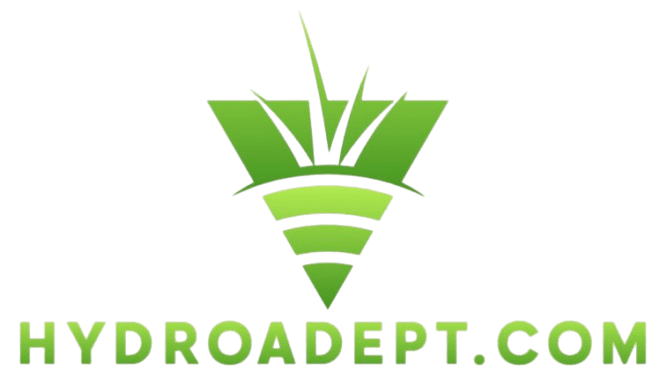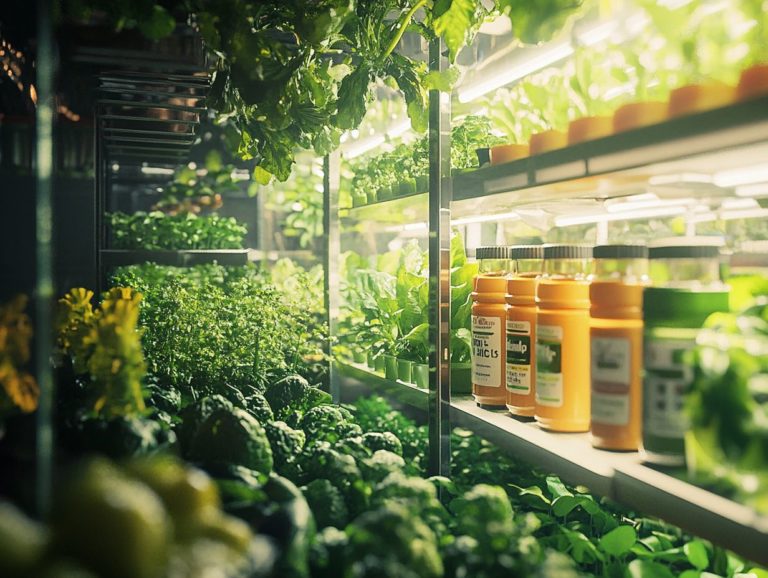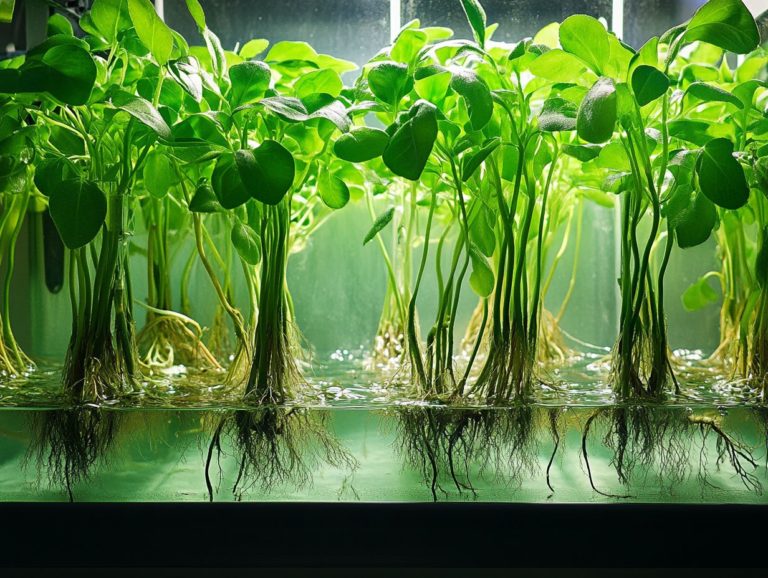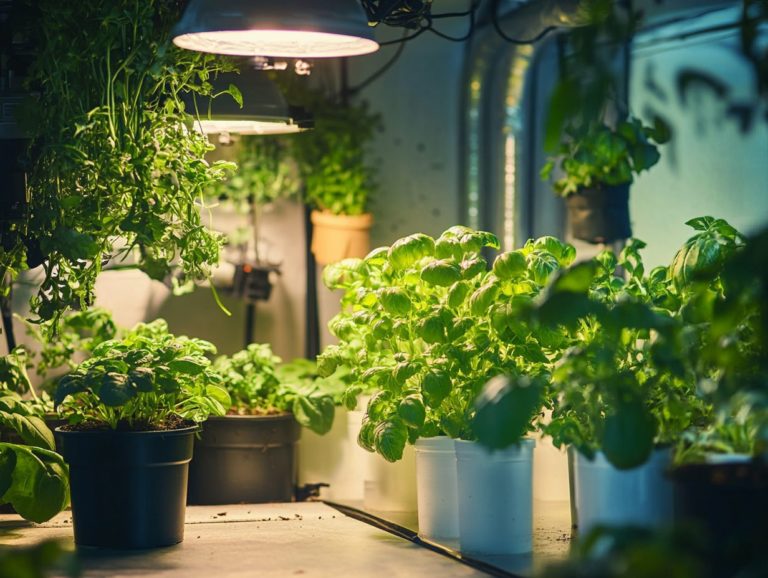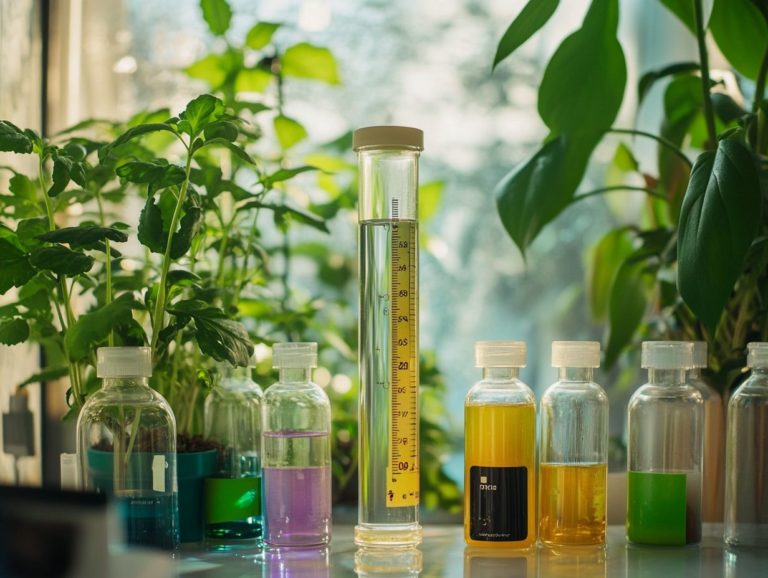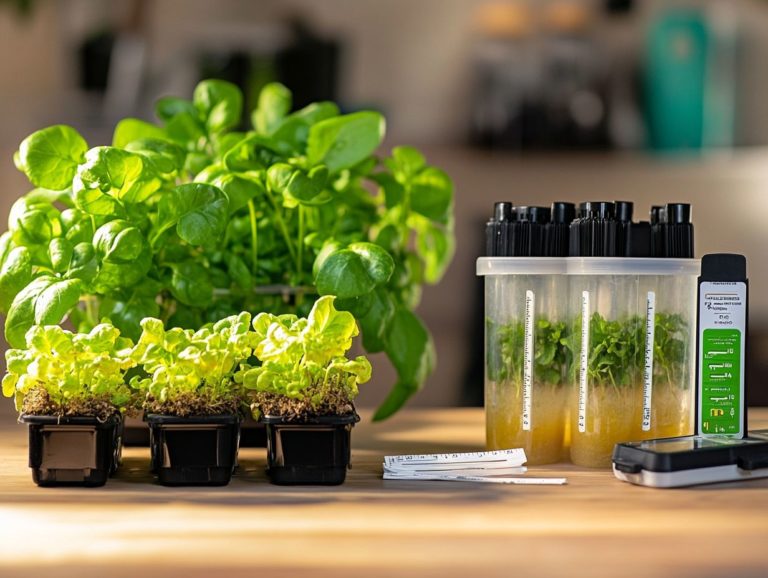The Role of Nitrogen in Hydroponic Growth
Hydroponics is revolutionizing the way you cultivate plants. It facilitates faster growth and higher yields all without the need for soil, making it a game-changer for modern farming!
At the core of this innovative method is nitrogen, a vital nutrient that significantly impacts plant health and development, particularly in hydroponic systems.
Get ready to explore nitrogen’s crucial role in photosynthesis, the implications of both deficiency and excess, and effective strategies for incorporating it into your nutrient solutions in hydroponic systems.
You will also learn how to optimize nitrogen levels and the various factors, including macronutrients and micronutrients, that affect its availability.
Join in as you uncover the essential role of nitrogen in hydroponic growth, particularly through tailored nutrient recipes.
Contents
- Key Takeaways:
- The Importance of Nitrogen in Plant Growth
- Methods of Providing Nitrogen in Hydroponic Systems
- Optimizing Nitrogen Levels for Maximum Growth
- Other Factors that Affect Nitrogen Availability
- Frequently Asked Questions
- What is the role of nitrogen in hydroponic growth?
- How does nitrogen affect plant growth in a hydroponic system?
- What are the symptoms of nitrogen deficiency in a hydroponic system?
- Can too much nitrogen be harmful to plants in a hydroponic system?
- How can I ensure my plants receive enough nitrogen in a hydroponic system?
- Are there any alternative sources of nitrogen in hydroponic systems?
Key Takeaways:
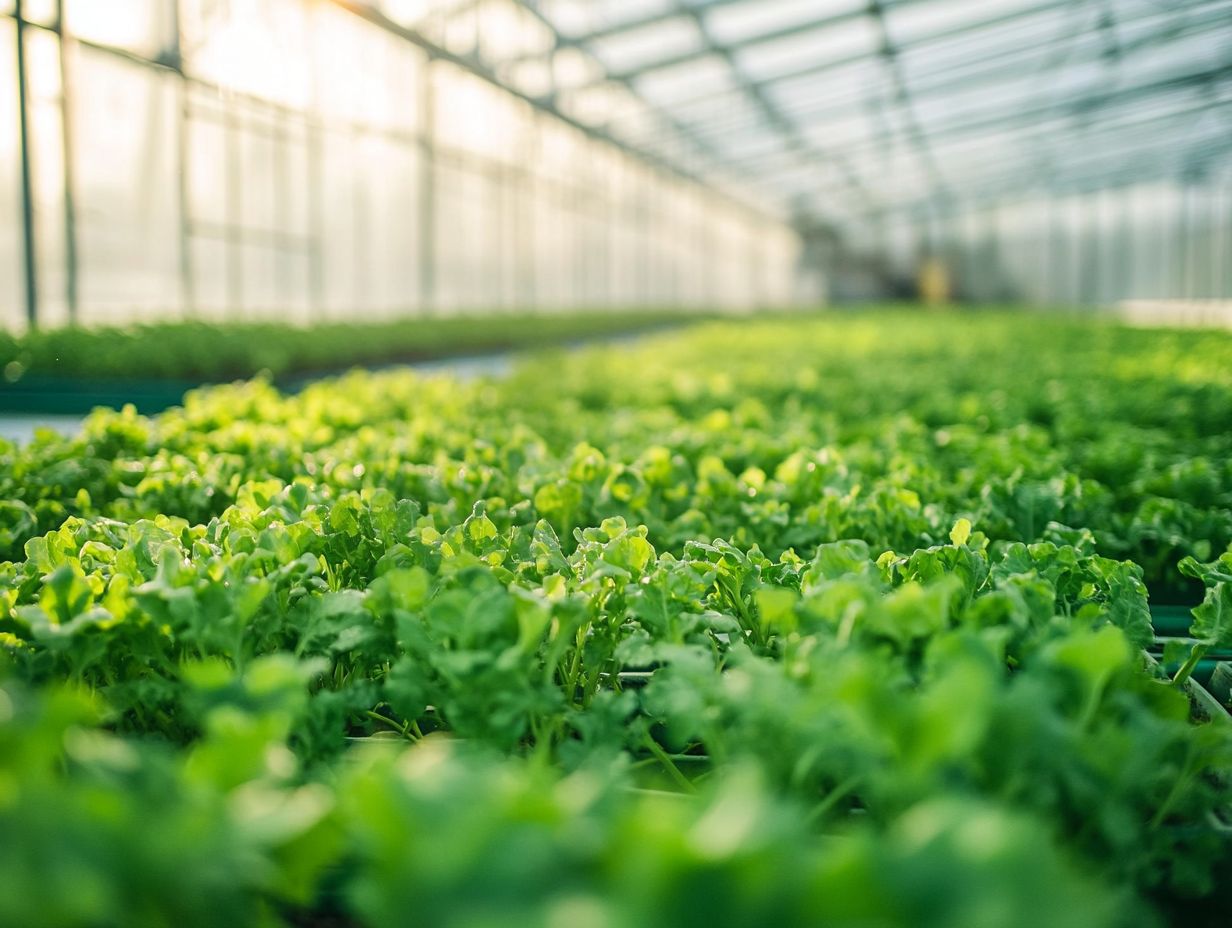
- Nitrogen is crucial for plant growth in hydroponic systems as it plays a key role in photosynthesis, the process of converting light energy into food. Maintaining balanced nitrogen, phosphorus, and potassium (NPK) levels is essential.
- Both deficiency and excess nitrogen can negatively affect plant growth, making it important to carefully monitor and adjust nitrogen levels in hydroponic systems.
- The type and source of nitrogen used in hydroponic systems, such as ammonium nitrate and calcium nitrate, along with factors like pH balance and environmental conditions, can greatly impact nitrogen’s availability and effectiveness for plant growth.
What is Hydroponics?
Hydroponics is your gateway to innovative agriculture, where you grow plants in nutrient-rich solutions tailored specifically to their needs instead of soil.
This method allows for efficient resource utilization and promotes optimal plant growth, particularly in systems like Hydro-Gardens.
Thriving in controlled environments, hydroponics is perfect for various crops, including tomatoes and lettuce. By employing systems like Hydro-Gardens, you can create precise nutrient recipes and effective fertilizer programs tailored to each plant’s specific needs.
With an emphasis on water quality and the right nutrient solutions, hydroponics offers the promise of higher yields and faster growth cycles.
This approach allows for the successful cultivation of crops like tomatoes and lettuce. Managing nutrient solutions becomes vital, as they provide the essential minerals for photosynthesis and overall plant nutrition.
These systems often incorporate advanced technologies like drip irrigation and aeroponics, significantly boosting efficiency and reducing water consumption, thereby enhancing nutrient solution effectiveness.
Water quality is crucial for ensuring that your plants receive the right pH levels and oxygenation, both vital for healthy roots and effective nutrient absorption in hydroponic systems.
With all these advantages, it’s no wonder hydroponics is gaining traction among urban gardeners and commercial growers alike. They are eager to maximize productivity while minimizing their environmental impact through efficient nutrient management.
The Importance of Nitrogen in Plant Growth
Nitrogen is essential for plant growth, serving as a fundamental building block of amino acids, proteins, and nucleic acids. These components are vital for healthy, thriving crops.
In hydroponic systems, maintaining a precise balance of macronutrients and micronutrients including nitrogen, phosphorus, and potassium is vital.
This careful calibration ensures optimal NPK levels, promoting robust plant development and maximizing yield efficiency in your hydroponic crops.
Consider exploring hydroponics for your gardening or farming needs to experience these benefits firsthand!
Nitrogen’s Role in Photosynthesis
Nitrogen is vital for photosynthesis. It is a key component of chlorophyll, which helps plants capture sunlight and transform it into energy.
This process is essential for plant growth and development, especially in hydroponic systems. Keeping nitrogen levels stable through effective nutrient solutions, like the modified Sonneveld solution, optimizes photosynthesis efficiency.
Nitrogen works closely with other nutrients like phosphorus and potassium. These nutrients help synthesize amino acids and nucleic acids, which are essential for plant metabolism.
Without a balanced supply of these nutrients, your hydroponic crops may face stunted growth and diminished yields. Using complete fertilizers can enhance your plants’ health.
These macronutrients not only support vigorous photosynthesis but also help build strong plants. This is crucial for maximizing output in your hydroponic farming setup.
Effects of Nitrogen Deficiency and Excess
Nitrogen deficiency or excess can hinder plant growth. It may lead to stunted development or even plant death in hydroponic systems.
Recognizing the signs of nitrogen imbalance is crucial. Symptoms include yellowing leaves from deficiency or leaf burn from excess.
Regularly monitoring nutrient levels helps you catch these issues early. Use tools like pH sensors and Electrical Conductivity meters to maintain balance.
While nitrogen is vital for healthy foliage, too much can prevent fruit and flower production, especially in crops like tomatoes and lettuce.
If nitrogen is lacking, consider adding nitrogen-rich options like ammonium nitrate. To reduce excess, diluting the nutrient solution can help.
Understanding these signs will lead to healthier growth and maximize yields in your hydroponic environment.
Methods of Providing Nitrogen in Hydroponic Systems
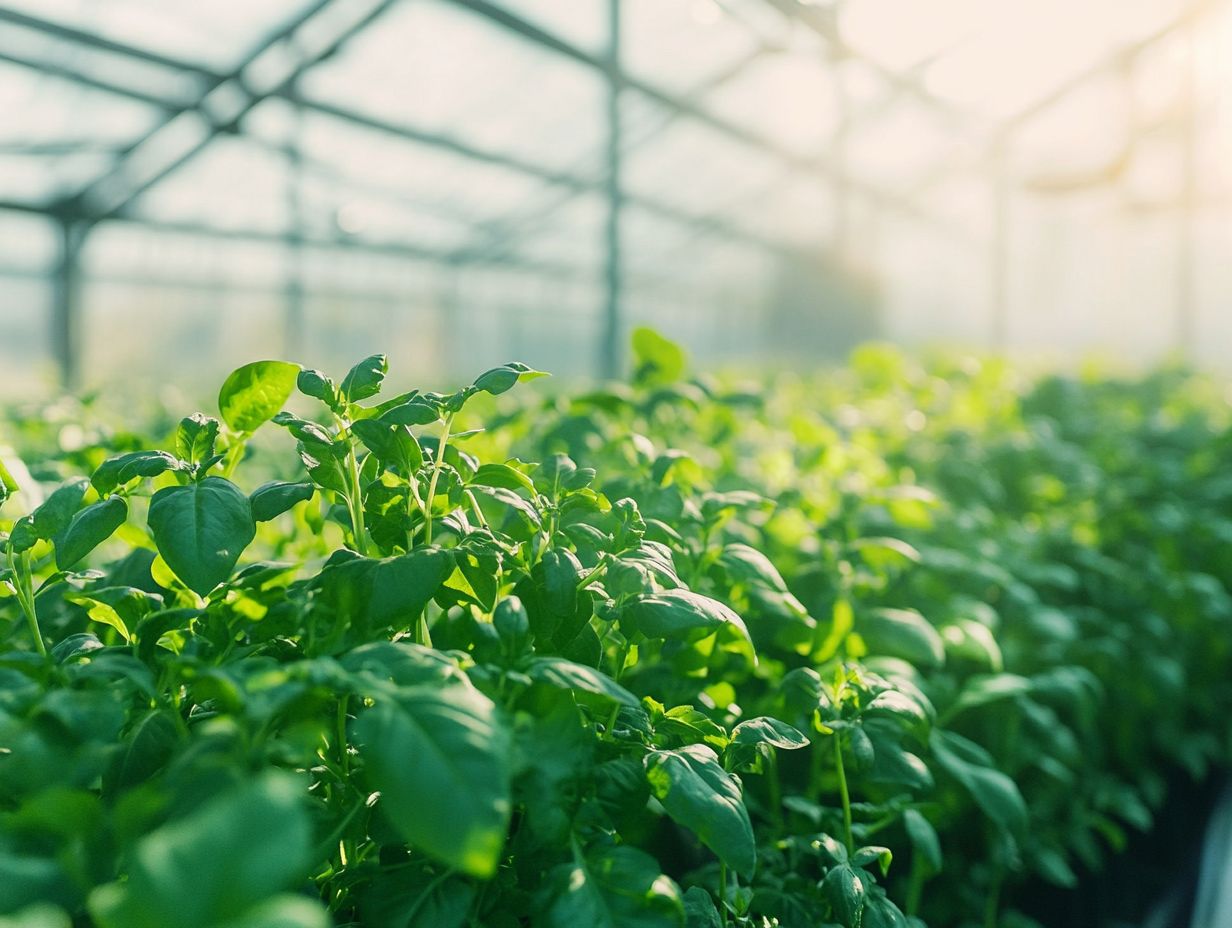
Using the right forms of nitrogen is essential for plant health. There are both organic and inorganic sources available.
Options like ammonium nitrate and calcium nitrate allow you to customize nutrient solutions for high-yield crops like tomatoes and lettuce. This tailored approach boosts plant health and maximizes yield.
Organic vs. Inorganic Sources
In hydroponics, your choice between organic and inorganic nitrogen sources can profoundly impact plant growth and nutrient uptake. Each option presents its own advantages and challenges. Organic sources, like compost teas, offer a slow-release form of nitrogen. In contrast, inorganic options such as ammonium nitrate and calcium nitrate provide rapid availability. It’s crucial to understand the specific requirements of your crops, such as tomatoes and lettuce, to make the best decision regarding nutrient solutions.
Organic nitrogen sources enhance soil structure and support beneficial microbial activity, contributing to a more resilient ecosystem. However, inorganic options tend to promote quicker increases in plant biomass and yield, especially in controlled hydroponic environments. Heavy reliance on synthetic fertilizers can lead to nutrient leaching and pollution, raising concerns about the long-term sustainability of hydroponic practices.
In hydroponic systems, achieving a careful balance between organic and inorganic nitrogen is essential for optimizing plant nutrition. Organic sources might not always meet the immediate needs of fast-growing crops like tomatoes, while inorganic sources require diligent management to avoid nutrient imbalances. Ultimately, the decision involves weighing both the immediate benefits and the long-term impacts on plant health, growth rates, and environmental sustainability.
Choosing the Right Nitrogen Supplement
Choosing the right nitrogen supplement for your hydroponic system is crucial for maintaining optimal nutrient solutions tailored to your crops, such as tomatoes and lettuce. This ensures robust nutrition through effective fertilizer programs. Consider the growth stage of your plants seedling, vegetative, and flowering stages as each stage has specific nutrient requirements that guide your selection of nitrogen supplements.
Understanding the different growth stages is vital, as each stage comes with varying nitrogen needs that directly impact plant health and yield. Pay close attention to the NPK (Nitrogen, Phosphorus, Potassium) levels in your nutrient solution; balanced ratios are key to promoting overall vigor and ensuring your crops thrive.
The variety of nitrogen forms available, such as ammonium, nitrate, and urea, significantly influences nutrient uptake and plant metabolism. To enhance your understanding, consider understanding the role of sulfur in hydroponics. Additionally, conduct soil tests and monitor pH levels alongside Electrical Conductivity measurements to inform your selection process, maximizing the growth potential of your hydroponic crops.
Optimizing Nitrogen Levels for Maximum Growth
Optimizing nitrogen levels in hydroponic systems is crucial for unlocking the full potential of plant growth and yield. This demands your attention and meticulous adjustments to nutrient concentrations tailored to the unique requirements of each crop, ensuring that nitrogen levels are balanced.
By utilizing tools like Electrical Conductivity (EC) meters and understanding the interplay of various factors, you can maintain the perfect nitrogen balance. This fosters robust plant health and thriving harvests in your Hydro-Gardens.
Monitoring and Adjusting Nitrogen Levels
Monitoring and adjusting nitrogen levels in your hydroponic system is crucial to ensure your crops receive the precise nutrients they need for optimal growth. Use tools like EC meters and testing kits to accurately assess nitrogen concentrations in your nutrient solutions and make necessary adjustments to prevent deficiencies or excesses.
Along with EC meters, pH meters are critical for ensuring nutrient solubility, as nitrogen availability is closely tied to pH levels. Familiarize yourself with the optimal nitrogen ranges for your specific crops, typically falling between 150 to 200 mg/L. If you discover low nitrogen levels, a nitrogen-rich fertilizer can swiftly remedy the situation. Conversely, a high reading may require you to dilute your nutrient solution.
Continual monitoring not only enhances crop health but also promotes efficient resource utilization, ultimately leading to bountiful harvests in your hydroponic setup.
Other Factors that Affect Nitrogen Availability
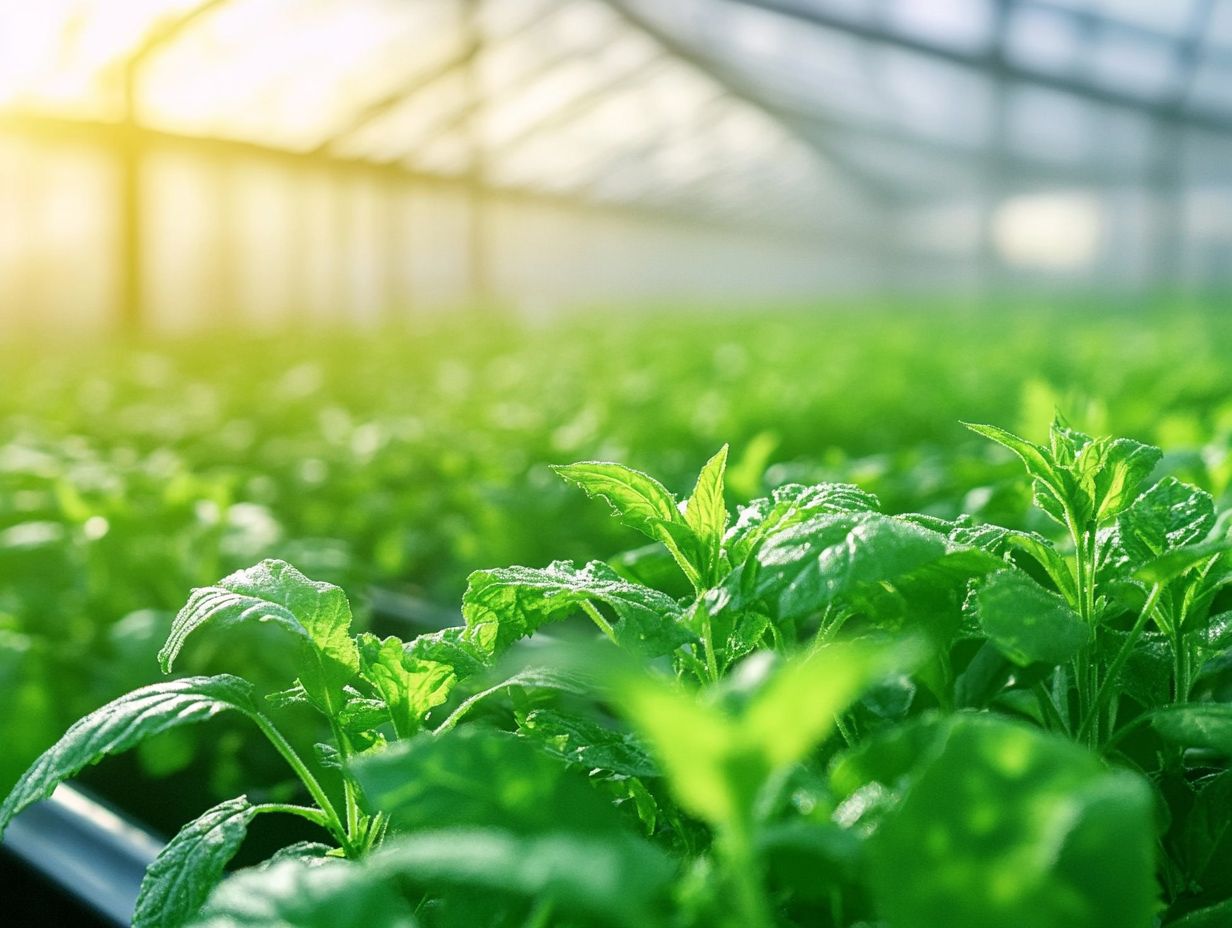
Numerous factors can significantly impact nitrogen availability in hydroponic systems, including pH balance, nutrient interactions, and environmental conditions such as temperature and humidity. Grasping these variables is crucial for you as a grower, enabling you to maintain optimal nutrient solutions that foster healthy plant growth and unlock maximum yield potential.
pH Balance and Nutrient Interactions
Maintaining the proper pH balance is absolutely vital for your plants success in hydroponics, as it directly influences how well nutrients interact, especially the availability of nitrogen for plant uptake. When you keep the pH within the optimal range, you enable efficient absorption of nutrients, which promotes healthy plant growth and maximizes your yield.
If the pH strays from the ideal range, your plants can suffer from nutrient deficiencies or toxicities that hinder their overall development. For example, a pH level that’s too low can increase the solubility of certain metals like aluminum, negatively affecting the roots. On the flip side, a high pH can lock out critical nutrients such as iron, resulting in chlorosis and stunted growth.
Maintaining a balanced pH not only enhances nutrient interactions but also supports robust root development, ensuring your plants are resilient against pests and diseases. Successful hydroponic growers make it a priority to regularly monitor and adjust pH levels, creating the perfect environment for their plants to thrive.
Environmental Factors and Plant Uptake
Environmental factors such as light, temperature, humidity, and airflow play a pivotal role in how effectively plants uptake nitrogen in hydroponic systems. By optimizing these conditions, you can significantly enhance nitrogen absorption, ensuring your plants receive the essential nutrients they need for robust health.
The interaction among these variables creates an ideal environment for maximizing nutrient efficiency. For instance, by maintaining optimal light intensity and duration, you can stimulate photosynthesis, which in turn increases the nitrogen demand of your plants. Managing temperature levels is equally important, as it ensures that metabolic processes remain active and promotes further nutrient absorption.
Maintaining adequate humidity levels prevents excessive transpiration, allowing for better moisture retention in the root zone. Adjusting airflow just right can turbocharge gas exchange for your plants, providing them with the necessary carbon dioxide while facilitating nitrogen uptake. Implementing these strategies can significantly elevate plant growth, leading to a more fruitful hydroponic yield.
Frequently Asked Questions
What is the role of nitrogen in hydroponic growth?
Nitrogen plays a crucial role in hydroponic growth as it is an essential element for plant growth and development.
How does nitrogen affect plant growth in a hydroponic system?
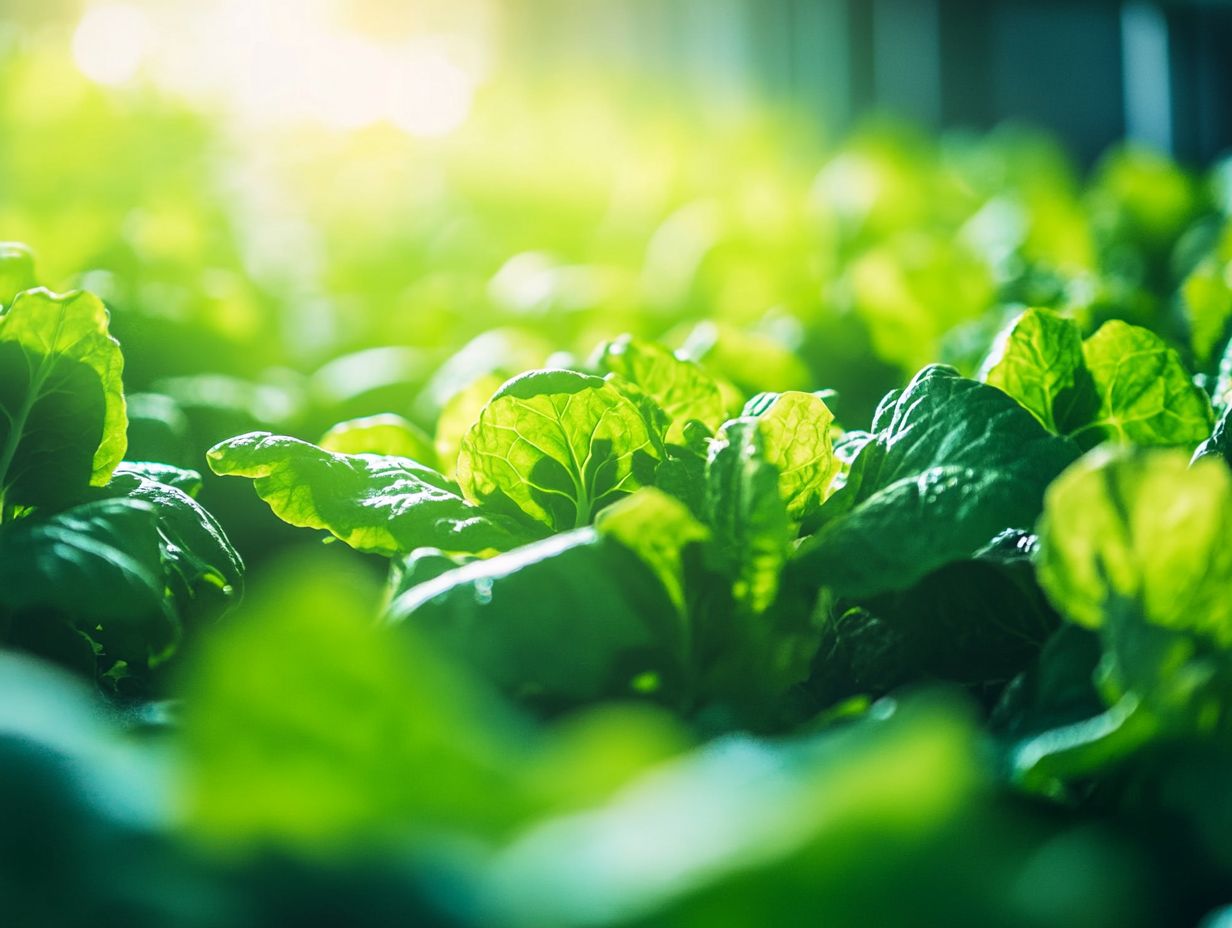
Nitrogen is responsible for promoting leafy, green growth in plants through its role in photosynthesis and protein synthesis.
What are the symptoms of nitrogen deficiency in a hydroponic system?
Plants lacking nitrogen may exhibit yellowing and stunted growth, as well as reduced fruit and flower production.
Can too much nitrogen be harmful to plants in a hydroponic system?
Yes, excessive levels of nitrogen can lead to nutrient imbalances and toxicity, resulting in burning or wilting of plant leaves.
How can I ensure my plants receive enough nitrogen in a hydroponic system?
Regularly testing and adjusting nutrient levels is important for maintaining proper nitrogen levels. Additionally, using nitrogen-rich fertilizers and supplementing with nitrogen additives can help provide a steady supply for plant growth.
Are there any alternative sources of nitrogen in hydroponic systems?
Yes, some hydroponic growers use organic sources of nitrogen such as fish emulsion or compost tea to provide a more natural and sustainable option for plant nutrition.
Start testing your nitrogen levels today to ensure your plants thrive!
